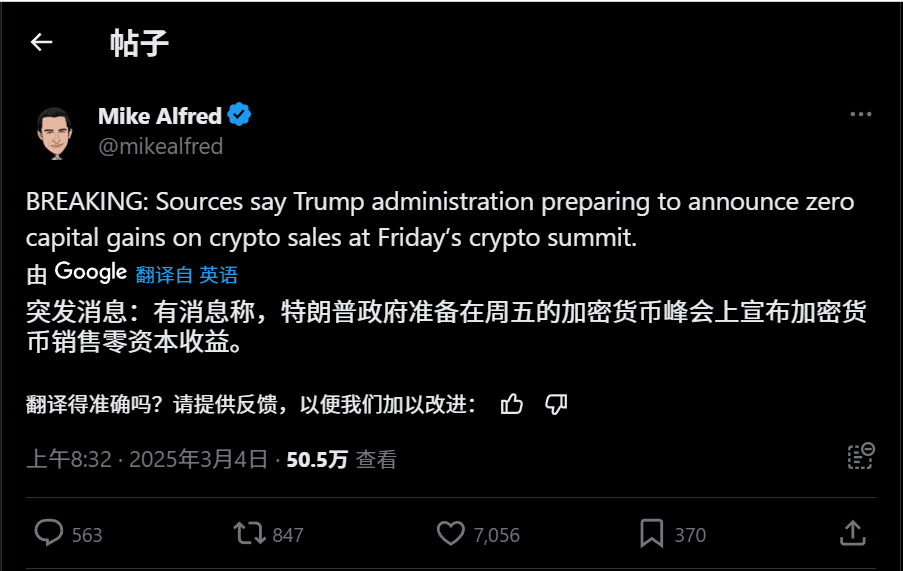
According to reports, the Trump administration is set to unveil a significant policy at the cryptocurrency summit on March 7 (this Friday), proposing zero capital gains tax on cryptocurrency sales. Simply put, profits from cryptocurrency sales will be exempt from capital gains tax!

This news was revealed by Mike Alfred, founder of the digital asset investment platform Eaglebrook Advisors, on social media platform X, and has attracted widespread attention in the market.
Potential advantages and main objectives of the new policy
If the new policy is implemented, it will exempt U.S. citizens from capital gains tax when selling cryptocurrencies, replacing the current tax policy, which imposes a maximum of 37% on short-term holders and a maximum of 20% on long-term holders. This move is expected to significantly reduce transaction costs, thereby enhancing market vitality and investment attractiveness.

The new policy is expected to prioritize benefiting domestically developed crypto projects, such as XRP and HBAR, while overseas projects may face an additional 30% tax burden. This also resonates with Trump's previous strategy to promote the leading position of American crypto innovation. The aim is to attract capital and talent through tax incentives and further promote the development of the U.S. in the cryptocurrency field.
Market expectations and potential impacts

Once news of Trump's post spread, tokens such as XRP, SOL, and ADA mentioned by Trump reacted swiftly in the market, with prices significantly rising in the short term. This phenomenon also aligns with the Trump administration's past policy actions in the cryptocurrency sector. For example, Trump has publicly stated multiple times that the U.S. should establish a Bitcoin strategic reserve and support Bitcoin ETFs, which have repeatedly triggered significant market fluctuations.
In addition, the Trump administration aims to promote a deep binding between stablecoins and the dollar through tax exemption policies, to consolidate the dollar's dominant position in global cryptocurrency trading. Currently, 95% of stablecoins are pegged to the dollar, and their reserve assets are mostly invested in U.S. Treasury bonds, forming a 'dollar repatriation' mechanism.
At the same time, the policy transformation of the regulatory framework may coordinate with the (21st Century Financial Innovation and Technology Act) and clarify the classification of crypto assets (such as stablecoins, digital commodities, etc.), providing clear guidance for the classification of crypto assets and promoting regulation towards 'responsible innovation.'
Controversy and uncertainty
Despite the continuous good news, there are also skeptical voices pointing out that the Trump family’s deep involvement in crypto projects (such as issuing TRUMP Memecoin and supporting the DeFi platform WLFI) raises questions about whether the new policy may benefit their personal or related projects.

However, implementing this will be fraught with difficulties. Although the Republican Party holds the dominant power in Congress, policy adjustments must go through statutory legislative processes, and it is likely to encounter resistance and challenges from Democrats regarding potential tax evasion.
Meanwhile, the market also faces the hidden dangers and concerns of volatility. Previously, Trump's tariff policies led to a nearly $400 billion evaporation of cryptocurrency market value in a single day. If this tax exemption policy is not executed as expected, it may trigger a new wave of selling.
Industry references and KOL perspectives
The market's attitude towards the proposed zero capital gains tax policy on cryptocurrency sales by the Trump administration is polarized.
Optimists believe that this policy is likely to accelerate the integration of crypto assets into mainstream financial markets, attracting participation from traditional financial institutions, thereby injecting new vitality into the development of cryptocurrencies. They also point out that this will help enhance the U.S.'s competitiveness in the global cryptocurrency market and consolidate its leadership position.
However, the cautious faction has expressed concerns about the short-term speculative effects that the policy may bring, fearing that the market may become overheated as a result. Additionally, they are worried that regulatory opacity may provide opportunities for market manipulation, increasing market risks and posing a threat to the long-term healthy development of cryptocurrencies.
Conclusion:
If the Trump administration's policy is successfully implemented, it could become a landmark event marking the shift of U.S. crypto regulation from 'high pressure' to 'supportive.' The core logic is to bring cryptocurrencies into the dollar-dominated financial system through tax incentives and regulatory relaxation. However, the actual effects of the policy still need to be observed regarding Congressional legislative progress and long-term market responses.
Do you think zero capital gains tax will drive cryptocurrencies to become mainstream assets? Is Trump's policy more about personal interest? Feel free to discuss!





